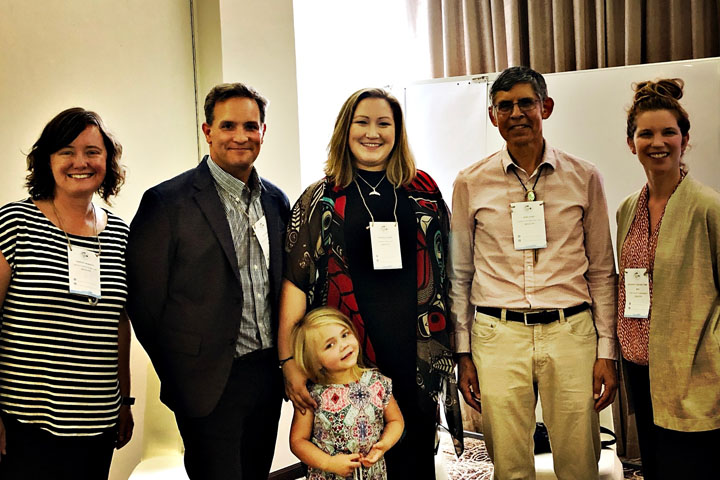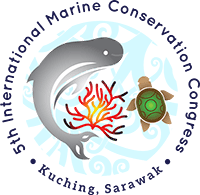
Members of the panel discussing the transition from MaPP marine planning to implementation of the plans were, left to right, Kristin Worsley, Steve Diggon, Danielle Shaw, Russ Jones, and Meaghan Calcari-Campbell. (Photo credit: Caroline Butler)
In a panel presentation at the fifth International Marine Conservation Congress (IMCC5) in Kuching, Sarawak, held June 24-29, 2018, delegates from the Marine Plan Partnership (MaPP) discussed the transition from marine planning to implementation of the MaPP marine plans. Moderated by Meaghan Calcari-Campbell of the Gordon and Betty Moore Foundation, the discussion covered key steps in the planning process, implementation achievements and learning to date, and insights on how the team is overcoming challenges. The presentation was part of a symposium that focused on achievements in governance, marine zoning and protection, stewardship and monitoring, and sustainable economic development.
Kristin Worsley, manager, Marine and Coastal Resources, B.C. Ministry of Forests, Lands, Natural Resource Operations and Rural Development, reflected that, “This conference was a great opportunity to share the early learning we’ve had in implementing the MaPP plans and to learn about what others are doing around the world. Marine spatial planning is often touted as a useful tool for addressing a range of issues and interests. But there aren’t that many opportunities to talk with other practitioners about how to do it.”
Russ Jones, consultant to the Haida Oceans Technical Team, Council of the Haida Nation, said, “Our panel discussion emphasized enabling conditions for MaPP and the importance of governance arrangements between First Nations in northern British Columbia to co-operative planning and ongoing implementation. Governance structures such as sub-regional implementation teams are established through government-to-government agreements with the Province of British Columbia and continue to balance the bottom up approach to planning required by First Nations with the need for ongoing leadership and co-ordination. Discussions delved into the concrete outcomes of MaPP as well as recent work with the federal government that are contributing incrementally to enhanced marine protection and sustainable economic development in the Northern Shelf Bioregion. Our story resonated with communities and planners elsewhere who are striving for a stronger community voice in marine planning and management.”
Other panel presenters were Steve Diggon, regional marine planning co-ordinator for Coastal First Nations-Great Bear Initiative and Danielle Shaw, Stewardship Director with the Wuikinuxv Nation.
During the question and answer section of the session, the panel members fielded questions on strategies to ensure consistency between and among the plans at different scales, how MaPP is monitoring human well-being indicators, whether zoning is a traditional tool used by First Nations, and how decision-making between governments works. They also responded to queries about ways to resolve conflicting uses in overlapping First Nation traditional territories, and on the impacts of ocean noise and which level of government is responsible for regulating noise.
At a separate session, Caroline Butler, Gitxaala Fisheries Program, presented Cultural Conservation Priorities: A methodology for integrating Indigenous values into marine protected area network design.
Butler commented, “The community-based planning process and this methodology for integrating data were of significant interest to marine planners in a number of other countries. Planners throughout the world are seeking effective and efficient ways to attend to local values and practices – often under very tight timelines. This conference was a great opportunity to share our experiences and learn about other processes. The marine planning governance structures and methodologies that were developed through MaPP and continued in the Marine Protected Area Network for British Columbia’s Northern Shelf region are quite progressive when presented in a global context.”
The IMCC5 was co-ordinated by the Society for Conservation Biology. More information can be found at https://conbio.org/mini-sites/imcc5/
More News »




